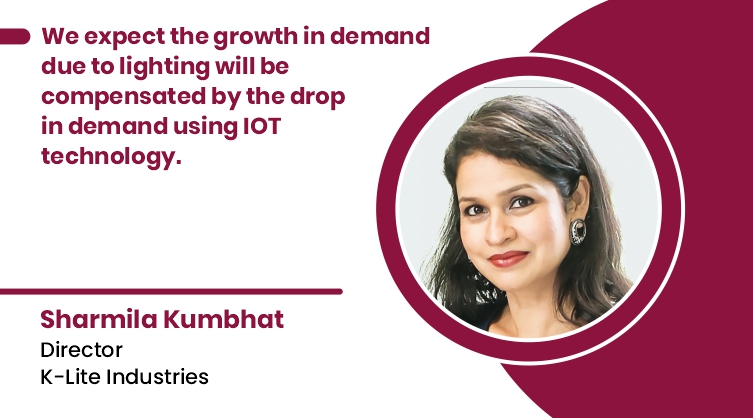Lighting industry adapts to innovation and sustainability
By EPR Magazine Editorial November 2, 2023 5:30 pm
By EPR Magazine Editorial November 2, 2023 5:30 pm

We expect the growth in demand due to lighting will be compensated by the drop in demand using IOT technology.
The lighting industry is undergoing a transformative evolution driven by the relentless pursuit of energy efficiency, durability, and sustainability. With the advent of LED technology and the integration of IoT solutions, lighting manufacturers are catering to a growing demand for smart, long-lasting, and eco-friendly lighting products. In this ever-changing landscape, they must adapt to evolving technologies, support renewable energy integration, comply with regulations, and ensure a skilled workforce to stay competitive and enhance product durability.
Demand for energy-efficient and long-lasting lighting products
With the advent of LED technology, energy efficiency is achieved very comfortably and is being improved continuously. Even with LED sources, smart lighting concepts through IOT are becoming integral to lighting design. In turn, we expect the growth in demand due to lighting will be compensated by the drop in demand using IOT technology. Regarding the long-lasting (lifetime) of lighting products, light emitting diodes (LED) are static devices with a lifetime of around 50000 hrs. Hence, controllers such as driver/power supply units play a major role in the guaranteed lifetime. With so many electronic components in these devices, manufacturers must develop a foolproof and long-lasting controller to sustain in the market.
Evolving smart grid and IoT technologies
As lighting designers say – with LED lighting, you can now play and change the mood with light. Unimaginable things are happening. Tuning of colours, sequencing of lights and possibilities to create any combination of colours, control of CCT, multi controls, etc., with smart lights are unique. Reliability levels are excellent. The way things are developing and changing may not be long before we think in our mind, and it will be translated into action to turn off or switch on any device through IOT / signalling, etc.
Integration of renewable energy sources
Lighting manufacturers are the pioneers in propagating the advantage and necessity of developing and using renewable sources. For example, when they introduced a simple lantern with a solar cell for the huts in remote villages without electricity, it changed their outlook and way of life. India still being a rural-dominated country, and since the whole lighting is now under the LED domain and the input power is only DC, the possibility of integrating the tiny energy sources with solar cells directly for the lighting through a storage system (mini batteries) is expected to be a big market. If the development of Ni-Cd battery technology/power packs, make a turnaround for cheaper versions, and the consumption gets scaled up.Product safety, sustainability, and competitiveness in power sector
The government introduced compulsory BIS registration to ensure the product safety of all LED luminaires. The environmental concerns have also been addressed through Extended Producers Responsibility (EPR) certification and PWR rules. Governmental restrictions recently introduced for the over-exploitation of cheap imports of LED luminaire items have started showing results, and the manufacturers have begun working out alternate local developmental strategies for sustained growth. Importing LED chips, which are very cheap but with inferior quality, is a vast environmental problem, and the government should restrict such imports.
Need for a skilled workforce
Except for a minimal development and testing area, the requirement for a skilled workforce for the lighting industry is very limited. Such skilled workforce necessity is only in the lighting design and architectural lighting field. The number of engineering institutions is considerably high, and the outflow of students, including master’s degree holders and doctoral scholars, especially in electrical and electronics, will comfortably meet the requirement of a skilled workforce for the lighting industry.
Spokesperson– Ms. Sharmila Kumbhat, Director — K-Lite Industries
We use cookies to personalize your experience. By continuing to visit this website you agree to our Terms & Conditions, Privacy Policy and Cookie Policy.